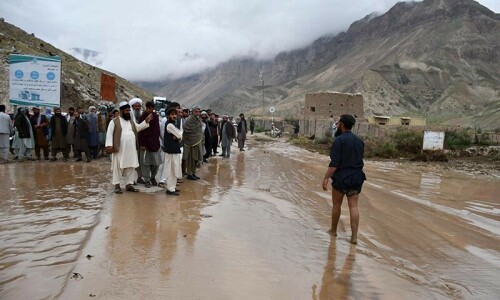YANGON: Myanmar’s navy has brought ashore 200 Bangladeshis found in a boat off its coast, after its military chief said some of the thousands of migrants that have landed in Malaysia and Indonesia this month are pretending to be Rohingya Muslims to get UN aid.
In response, a senior US official said on Friday that the majority of the more than 3,000 migrants that have come ashore are Rohingya fleeing desperate conditions in Rakhine State in western Myanmar.
Southeast Asia’s migrant crisis blew up after a Thai crackdown on human trafficking led criminals to abandon overloaded boats in the Bay of Bengal and the Andaman Sea rather than risk trying to smuggle or traffic them through preferred transit routes in Thailand.
Take a look: In Asian seas, Rohingya migrants have nowhere to land
The United Nations refugee agency UNHCR estimated on Friday that some 3,500 migrants were still stranded on boats with dwindling supplies, and repeated its appeal for the region’s governments to rescue them.
Myanmar’s navy discovered two Thai boats on Thursday, one carrying migrants and the other empty, the Rakhine state government said in a press release on Friday.
“One is loaded with around 200 Bengali people,” it said, using the government term for illegal migrants from Bangladesh.
“The people on the boat were all from Bangladesh,” said Rakhine State government executive secretary Tin Maung Swe. “We will deport them.”
Myanmar has faced international criticism for not doing enough to help those at sea or stem the flow of migrants.
US Deputy Secretary of State Antony Blinken, who visited Myanmar on Thursday and Friday, called on the country to address the racial and religious discrimination and violence that Washington says is one of the causes of migration.
“The majority are, in fact, from Rakhine State, are Rohingya and have left because of the desperate conditions they face in Rakhine State,” Mr Blinken told reporters on Friday, speaking of the thousands of migrants that have come ashore in the region.
Most of Myanmar’s 1.1 million Rohingya are stateless and live in apartheid-like conditions in the state. Almost 140,000 were displaced in deadly clashes with majority Buddhists in Rakhine in 2012.
They are denied citizenship and have long complained of state-sanctioned discrimination.
Myanmar denies discriminating against the group and has said it is not the source of the problem. It classifies the group as Bengalis, a term rejected by most Rohingya for implying they are illegal immigrants from Bangladesh, despite having, in many cases, lived in Rakhine for generations.
Published in Dawn, May 23rd, 2015
On a mobile phone? Get the Dawn Mobile App: Apple Store | Google Play













































Dear visitor, the comments section is undergoing an overhaul and will return soon.